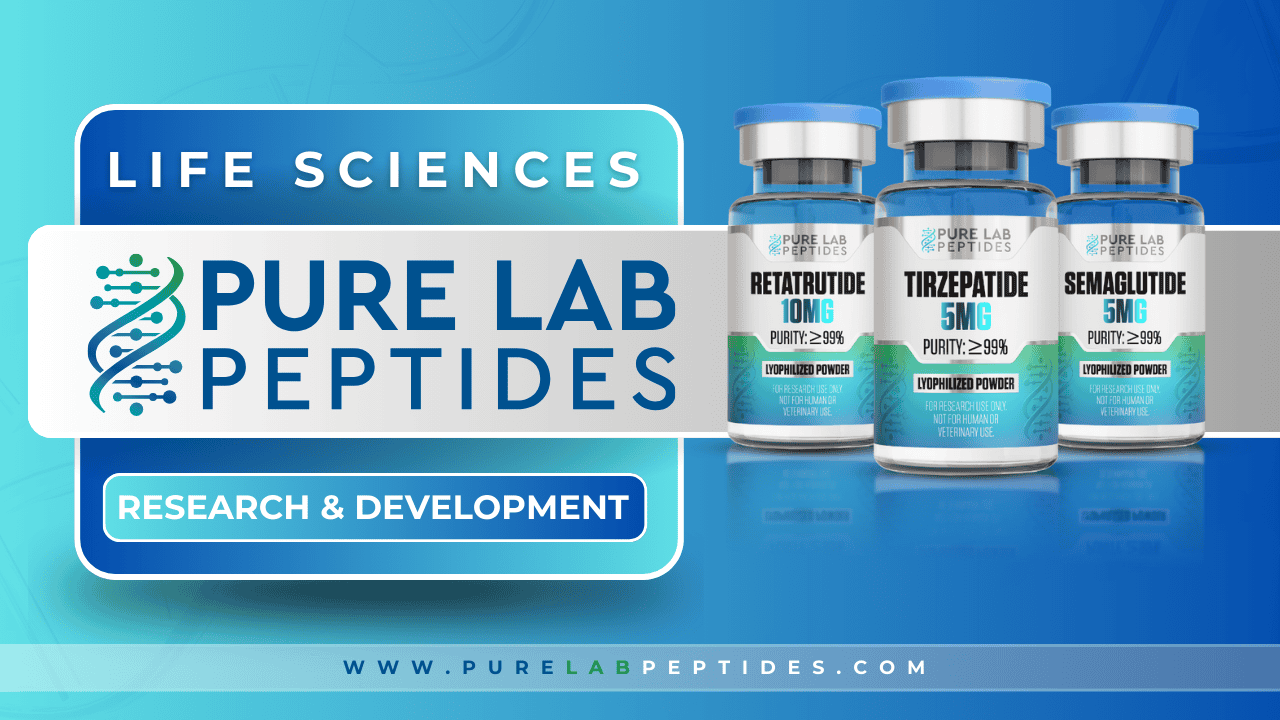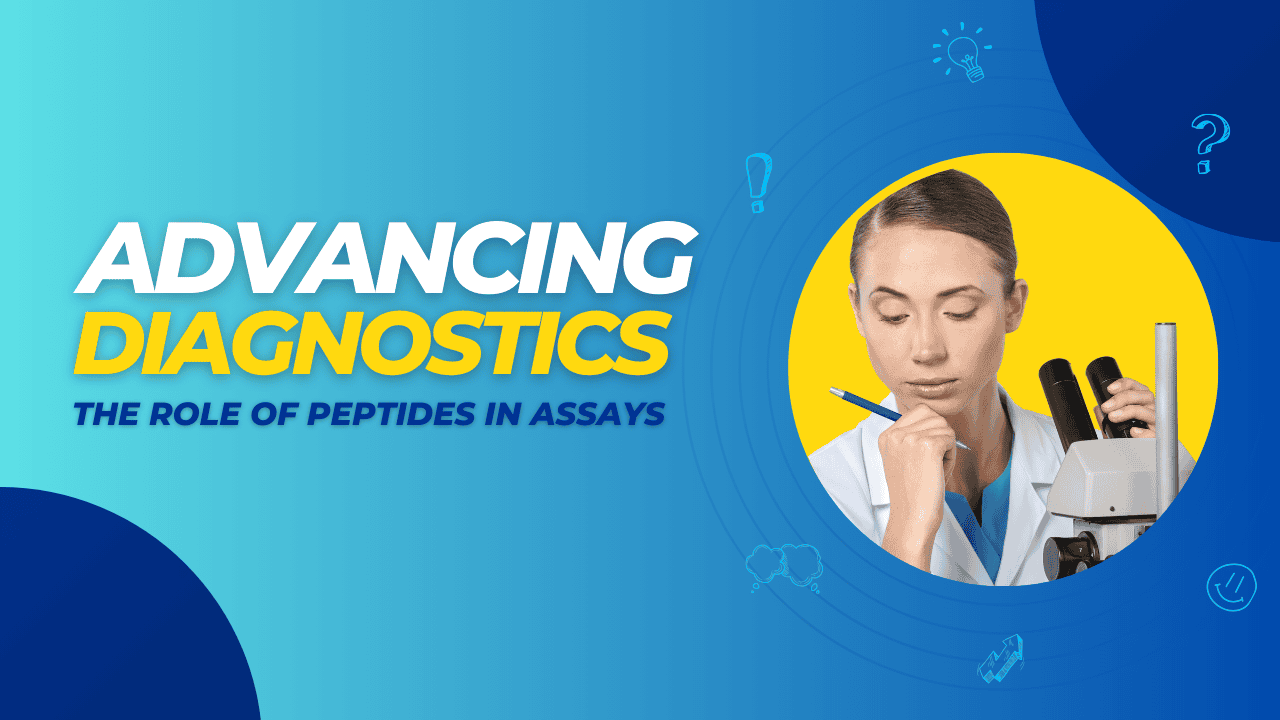

Pure Lab Peptides is in the spotlight for offering high-quality peptides crucial for research and development.
With a robust focus on scientific advancements in life sciences, Pure Lab Peptides ensures top-notch peptide synthesis, catering to various research fields such as neurobiology, oncology, and metabolic studies.
Imagine delving into the mind-boggling world of peptides and discovering how they can transform the landscape of therapeutic research.
This article is a deep dive into how Pure Lab Peptides is pioneering this field, and it’s totally worth reading because peptides – these tiny chains of amino acids – are revolutionizing the future of healthcare.
Peptides are short chains of amino acids that play a vital role in treatments and research. Unlike large protein structures, these peptides can more easily navigate the body, often with fewer side effects.
While small molecules can be potent, they often lack specificity. Therapeutic peptides, on the other hand, are highly specific in targeting receptors, making them formidable players in precision medicine.
With their ability to bind to specific receptors and modulate biological activity, therapeutic peptides have become a cornerstone of research and development. They’re like the Swiss Army knife of research tools – versatile and precise.
Pure Lab Peptides provides high-quality peptides, ensuring reliability and consistency in research results. Researchers trust Pure Lab Peptides because they prioritize purity and efficacy, truly raising the bar in the life sciences community.
Peptide synthesis is the process of creating peptides by forming peptide bonds between amino acids. It’s the magic behind developing these vital biological molecules.
Thanks to advances in peptide synthesis, we now have solid-phase peptide synthesis and microwave-assisted synthesis. These methods have made the creation of peptides more efficient and reliable.
Pure Lab Peptides ensures state-of-the-art technology and rigorous protocols to synthesize peptides, with each batch meeting the highest purity standards. They leave no stone unturned – or rather, no peptide bond unformed.
Techniques like solid-phase peptide synthesis allow for rapid and high-throughput production of peptides, making it possible to quickly generate peptides for various applications.
The precise synthesis of peptides ensures that they maintain their intended biological activity, which is crucial for both vitro and in vivo research.
Research peptides are custom peptides designed for specific scientific experiments. They open the door to new discoveries and are often pivotal in initial research phases.
From probing receptor mechanisms to exploring signal transduction pathways, research peptides are indispensable. They help scientists untangle complex biological processes.
Pure Lab Peptides provides tailored peptides for metabolic studies, aiding researchers in understanding disorders like type 2 diabetes and obesity.
In neurobiology, research peptides help in studying neurotransmitter functions and potentially developing treatments for central nervous systems disorders.
Peptides enhance tissue regeneration by acting as growth factors and signaling molecules, making them invaluable in regenerative medicine.
From acting as antigens to investigating major histocompatibility complex (MHC) interactions, peptides are central to immunology research.
Peptides bind to cell surface receptors, initiating signal transduction pathways that can alter cellular functions. It’s like turning on a light switch – simple, yet impactful.
Grasping receptor mechanisms is key to developing effective therapeutics. By tapping into this knowledge, researchers can design peptides that precisely target certain pathways.
Peptides can modulate signal transduction pathways, making them powerful tools in studying biological responses and disease mechanisms.
Pure Lab Peptides provides high-quality peptides that researchers rely on for studying intricate signal pathways, supporting groundbreaking discoveries.
Peptides are used in treating a wide range of conditions, from diabetes to cancer, due to their specificity and effectiveness as therapeutic agents.
Major therapeutic areas include oncology, infectious diseases, and metabolic disorders. Peptides have shown promise in delivering targeted treatments.
With advancements in peptide research, we can anticipate more peptide-based therapies being approved by the FDA, revolutionizing personalized medicine.
Peptides like GLP-1 have been game-changers in treating type 2 diabetes, illustrating the immense therapeutic potential of peptides.
GLP-1, or glucagon-like peptide-1, is a bioactive peptide involved in glucose metabolism, offering significant therapeutic potential for diabetes management.
GLP-1 increases insulin secretion and inhibits glucagon release, playing a crucial role in managing blood glucose levels in patients with type 2 diabetes.
Recent research has highlighted the potential of GLP-1 analogs in not just diabetes but also in obesity treatment. It’s a thrilling new frontier in metabolic research.
For effective use, GLP-1 should be synthesized with high purity and stability. Pure Lab Peptides provides such high-quality GLP-1, ensuring reliable research results.
Pure Lab Peptides supplies rigorously tested GLP-1 peptides, supporting researchers in uncovering new therapeutic applications.
Synthesize peptides using solid-phase peptide synthesis, ensuring each step is meticulously controlled to produce the desired peptide sequence.
Using high-quality peptide synthesizers and adhering to strict protocols are essential for successful synthesis. Pure Lab Peptides uses state-of-the-art equipment for this purpose.
Issues like peptide aggregation can occur, but with advanced techniques and expert knowledge, these challenges can be overcome.
In-house synthesis offers control over the peptide sequence and purity, allowing for custom modifications and quick iterations.
Pure Lab Peptides provides synthesis services, ensuring researchers get precisely tailored peptides, saving time and resources.
Chimeric peptides are hybrids, often combining functional domains of different peptides. They offer unique properties and enhanced therapeutic potential.
By combining properties of multiple peptides, chimeric peptides can exhibit improved biological activity, stability, and specificity.
Innovative research has explored chimeric peptides in oncology and infectious diseases, showing promising results.
Chimeric peptides can be integrated into research to explore novel therapeutic pathways, offering a blend of diverse biological activities.
Pure Lab Peptides excels in developing custom chimeric peptides, supporting cutting-edge research and therapeutic development.
High quality peptides ensure reproducibility and reliability in research. It’s like baking a cake; you need the best ingredients.
Look for suppliers like Pure Lab Peptides who use rigorous quality control measures to guarantee peptide purity and consistency.
Pure Lab Peptides offers high quality peptides that are meticulously tested for purity, providing researchers with trustworthy products.
Researchers commend Pure Lab Peptides for their exceptional customer service and unmatched product quality. It’s like finding the Holy Grail of research supplies.
Identify the exact requirements of your research and choose peptides that match those needs. Consult with suppliers to get custom solutions.
Pure Lab Peptides provides essential peptides for studying metabolic pathways and disorders, advancing our understanding of diseases like type 2 diabetes.
Supplied peptides have enabled breakthroughs in understanding neurotransmitter functions and developing potential treatments for neurological conditions.
By providing growth factors and bioactive peptides, Pure Lab Peptides supports research aimed at enhancing tissue regeneration and repair.
Collaborations with Pure Lab Peptides have led to significant advancements across various research fields, driving innovation forward.
Pure Lab Peptides commits to quality and precision, ensuring that research conducted with their products maintains the highest scientific standards.
With ongoing advances in peptide design and synthesis, the future holds exciting prospects for peptide-based therapies.
Synthetic peptides are at the forefront of new and promising treatments, offering solutions for previously challenging conditions.
Custom peptides allow researchers to explore novel pathways, enhancing our understanding of biological processes and potential treatments.
While challenges like stability and delivery exist, ongoing research and technological advancements provide significant opportunities for innovation.
Understanding regulatory frameworks, such as those set by the US Food and Drug Administration, is crucial in peptide research and development.
Adhering to regulatory standards ensures the safety and efficacy of peptide-based research, vital for advancing therapeutic applications.
Pure Lab Peptides follows stringent regulatory guidelines in all their processes, ensuring their products meet the highest standards of quality and safety.
Technological advancements, including AI and high-throughput screening, are revolutionizing peptide research, making it more efficient and expansive.
High-throughput screening allows rapid evaluation of peptide libraries, accelerating the discovery of promising peptide candidates.
Techniques like mass spectrometry and NMR spectroscopy provide detailed insights into peptide sequences and structures, crucial for research accuracy.
Ethical considerations in peptide research ensure that studies are conducted responsibly, with attention to potential impacts on human health and the environment.
Pure Lab Peptides adheres to ethical guidelines, ensuring that their research products are developed and used in a responsible manner.
Transparency in research fosters trust and collaboration, essential for advancing scientific knowledge and therapeutic development.
Utilize the expertise and quality peptides of Pure Lab Peptides to develop a robust research strategy that drives meaningful results.
Pure Lab Peptides provides tailor-made solutions to meet specific research needs, ensuring high relevance and impact.
Pure Lab Peptides’ commitment to quality ensures that researchers achieve reliable and reproducible results, essential for scientific progress.
Through providing high-quality peptides and expert guidance, Pure Lab Peptides supports researchers in the critical early stages of their projects, promoting innovation.
Therapeutic peptides are crucial in precision medicine and scientific research.
Pure Lab Peptides offers high-quality, reliable peptides for various research applications.
Understanding peptide synthesis and interactions with receptors can advance research.
GLP-1 and chimeric peptides represent significant areas of peptide research.
Buying high-quality research peptides from trusted sources ensures reliability.
Custom and synthetic peptides shape innovative therapies and therapeutic potential.
Regulatory compliance is essential for safe peptide research.
Advanced technologies continue to revolutionize peptide development and applications.
Canadian research peptides are bioactive molecules used in scientific studies, often to understand mechanisms of action within biological systems. These peptides can be both synthetic or natural peptides and are crucial in pharmaceutical research, especially for developing diagnostic and therapeutic applications.
Research peptides are short chains of amino acid residues used for scientific experiments, often in the study of peptides and proteins. They help researchers understand complex biological processes and mechanism of action, supporting advances in pharmaceutical research and therapeutic developments.
Research peptides are generally considered safe when used under controlled conditions by qualified professionals. They are often utilized in pharmaceutical research and tested for bioactivity and efficacy. However, they should be handled according to safety guidelines to minimize risk.
Yes, Sports Research Collagen Peptides are derived from grass-fed, pasture-raised cattle. This ensures a high-quality source of collagen, which is essential for maintaining structural proteins and overall bioactivity.
Sports Research Collagen Peptides are considered good due to their high quality and effectiveness. They provide essential amino acid residues for tissue repair and skin health, supporting natural physiological functions.
Research peptides used for weight loss should be approached with caution and scientific validation. While some peptides, like GLP-1, have shown potential, it’s essential to consult healthcare professionals to ensure safety and efficacy.
Research peptides can be effective in their intended applications, provided they are of high quality and used appropriately. Their bioactivity makes them valuable in scientific studies, particularly in understanding complex biological mechanisms.
The legality of research peptides varies by region and their intended use. They are generally legal for research purposes but must comply with regulations set by institutions like the Food and Drug Administration (FDA) unless otherwise specified.
Research peptides can be safe for humans when used within regulated scientific studies upholding specific purity and quality control. They undergo rigorous testing for bioactivity, safety, and efficacy before application in any broader context. It’s important to note, regardless of the purity and strict quality control, Pure Lab Peptides product are strictly for research purposes only and are not for human consumption.
Dr. Jean-Louis Reymond is a distinguished researcher in the field of peptide research, with a notable focus on peptide drug discovery and synthesis. With over 25 years of experience, Dr. Reymond has extensively contributed to the understanding and application of peptides in various therapeutic contexts. He is a professor of chemistry at the University of Bern and has published over 300 peer-reviewed papers, emphasizing his expertise in this field.
Dr. Reymond’s notable publications include:
Dr. Reymond’s innovative approach and meticulous research methodology have earned him the title of a thought leader in the peptide research community. He has been recognized with several awards, including the prestigious Novartis Prize for Chemistry, underscoring his authority and trustworthiness in peptide research and development.
Dr. Gregory L. Verdine is a renowned expert in chemical biology, focusing on peptide-based drug design and development. With a career spanning over three decades, Dr. Verdine has made groundbreaking contributions to understanding how peptides can be harnessed for therapeutic use. He is a Professor of Chemistry and Chemical Biology at Harvard University and has co-founded several biotech companies focusing on peptide therapeutics.
Key publications by Dr. Verdine include:
Dr. Verdine’s work exemplifies a blend of creativity and scientific rigor, contributing significantly to peptide-based therapeutic development. He has received numerous accolades, including the American Chemical Society’s Nobel Laureate Signature Award, which highlights his pioneering contributions and solidifies his status as a trusted authority in the field of peptide research.
Andrieu, J., Re, F., Russo, L., & Nicotra, F. (2018). Phage-displayed peptides targeting specific tissues and organs. Journal of Drug Targeting, 27(5–6), 555–565. https://doi.org/10.1080/1061186x.2018.1531419
Hirs, C. H. W. (1964). The chemistry of peptides and proteins. Annual Review of Biochemistry, 33(1), 597–632. https://doi.org/10.1146/annurev.bi.33.070164.003121
Kawamura, K., Sudo, S., Kumagai, J., Pisarska, M., Hsu, S. Y. T., Bathgate, R., Wade, J., & Hsueh, A. J. W. (2005). Relaxin research in the postgenomic era. Annals of the New York Academy of Sciences, 1041(1), 1–7. https://doi.org/10.1196/annals.1282.001
Li, Y., & Yu, J. (2014). Research progress in Structure-Activity relationship of bioactive peptides. Journal of Medicinal Food, 18(2), 147–156. https://doi.org/10.1089/jmf.2014.0028
Reddy, S. P., Alontaga, A. Y., Welsh, E. A., Haura, E. B., Boyle, T. A., Eschrich, S. A., & Koomen, J. M. (2023). Deciphering Phenotypes from Protein Biomarkers for Translational Research with PIPER. Journal of Proteome Research, 22(6), 2055–2066. https://doi.org/10.1021/acs.jproteome.3c00137
Satake, H., Osugi, T., & Shiraishi, A. (2021). Impact of Machine Learning-Associated research strategies on the identification of Peptide-Receptor interactions in the Post-Omics Era. Neuroendocrinology, 113(2), 251–261. https://doi.org/10.1159/000518572
Wang, G., Li, X., & Wang, Z. (2015). APD3: the antimicrobial peptide database as a tool for research and education. Nucleic Acids Research, 44(D1), D1087–D1093. https://doi.org/10.1093/nar/gkv1278
ALL ARTICLES AND PRODUCT INFORMATION PROVIDED ON THIS WEBSITE ARE FOR INFORMATIONAL AND EDUCATIONAL PURPOSES ONLY. The products offered on this website are intended solely for research and laboratory use. These products are not intended for human or animal consumption. They are not medicines or drugs and have not been evaluated or approved by the FDA to diagnose, treat, cure, or prevent any disease or medical condition. Any form of bodily introduction is strictly prohibited by law.









Discount Applied Successfully!
Your savings have been added to the cart.